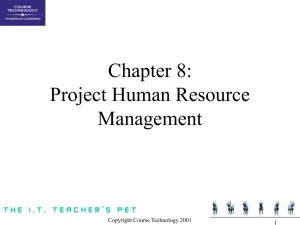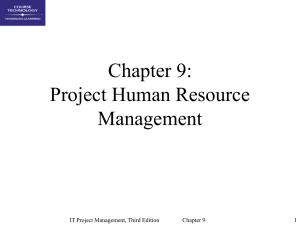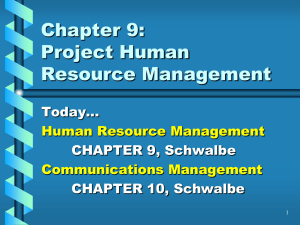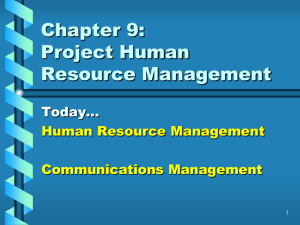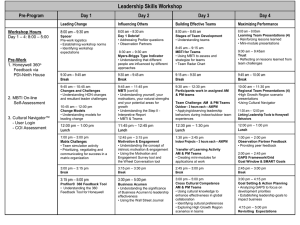Project Human Resource Management
advertisement
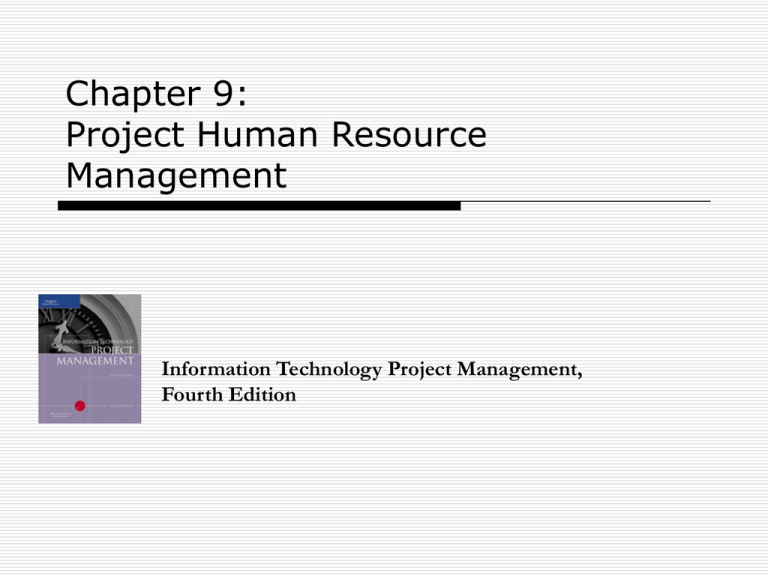
Chapter 9: Project Human Resource Management Information Technology Project Management, Fourth Edition Learning Objectives Explain the importance of good human resource management on projects, including the current state and future implications of human resource management, especially on information technology projects. Define project human resource management and understand its processes. Summarize key concepts for managing people by understanding the theories of Abraham Maslow, Frederick Herzberg, David McClelland, and Douglas McGregor on motivation, H. J. Thamhain and D. L. Wilemon on influencing workers, and Stephen Covey on how people and teams can become more effective. 2 Organizational Planning Involves identifying and documenting project roles, responsibilities, and reporting relationships. Outputs include: Project organizational charts Staffing management plans Responsibility assignment matrixes Resource histograms 3 Figure 9-2. Sample Organizational Chart for a Large IT Project 4 Figure 9-3. Work Definition and Assignment Process 5 Responsibility Assignment Matrixes A responsibility assignment matrix (RAM) is a matrix that maps the work of the project, as described in the WBS, to the people responsible for performing the work, as described in the OBS. Can be created in different ways to meet unique project needs. 6 Figure 9-4. Sample Responsibility Assignment Matrix (RAM) 7 Figure 9-5. RAM Showing Stakeholder Roles 8 Table 9-1. Sample RACI Chart R = Responsibility, only one R per task A = Accountability C = Consultation I = Informed 9 Staffing Management Plans and Resource Histograms A staffing management plan describes when and how people will be added to and taken off the project team. A resource histogram is a column chart that shows the number of resources assigned to a project over time. 10 Figure 9-6. Sample Resource Histogram 11 Acquiring the Project Team Acquiring qualified people for teams is crucial. The project manager who is the smartest person on the team has done a poor job of recruiting! Staffing plans and good hiring procedures are important, as are incentives for recruiting and retention. Some companies give their employees one dollar for every hour that a new person who they helped hire works. Some organizations allow people to work from home as an incentive. 12 Why People Leave Their Jobs They feel they do not make a difference. They do not get proper recognition. They are not learning anything new or growing as a person. They do not like their coworkers. They want to earn more money. 13 Resource Loading Resource loading refers to the amount of individual resources an existing schedule requires during specific time periods. Helps project managers develop a general understanding of the demands a project will make on the organization’s resources and individual people’s schedules. Overallocation means more resources than are available are assigned to perform work at a given time. 14 Figure 9-7. Sample Histogram Showing an Overallocated Individual What’s wrong with this picture? Assume 100 percent means Joe is working eight hours per day. 15 Resource Leveling Resource leveling is a technique for resolving resource conflicts by delaying tasks. The main purpose of resource leveling is to create a smoother distribution of resource use and reduce overallocation. 16 Figure 9-8. Resource Leveling Example 17 Benefits of Resource Leveling When resources are used on a more constant basis, they require less management. It may enable project managers to use a just-in-time inventory type of policy for using subcontractors or other expensive resources. It results in fewer problems for project personnel and the accounting department. It often improves morale. 18 Developing the Project Team The main goal of team development is to help people work together more effectively to improve project performance. It takes teamwork to successfully complete most projects. 19 Tuckman Model of Team Development Forming Storming Norming Performing Adjourning 20 Training Training can help people understand themselves and each other, and understand how to work better in teams. Team building activities include: Physical challenges Psychological preference indicator tools 21 Myers-Briggs Type Indicator (MBTI) MBTI is a popular tool for determining personality preferences and helping teammates understand each other. Four dimensions include: Extrovert/Introvert (E/I) Sensation/Intuition (S/N) Thinking/Feeling (T/F) Judgment/Perception (J/P) NTs, or rationals, are attracted to technology fields. IT people vary most from the general population in their tendency to not be extroverted or sensing. 22 Wideman and Shenhar’s Views on MBTI and Project Management* Most suited for project leadership: 100 percent: INTJ, ENTJ, ISTJ, ESTJ 50 percent: INTP, ENTP, ENFP, ENFJ Best suited as followers: 100 percent: INFJ, ISFJ 50 percent: INTP, ENTP, ENFP, ENFJ, ESFJ Not suited for project work: 100 percent: INFP, ISFP, ESFP, ISTP 50 percent: ENFP, ESTP *Wideman, R. Max and Aaron J. Shenhar, “Professional and Personal Development: A Practical Approach to Education and Training,” Project Management for Business Professionals, edited by Joan Knutson, 2001, p. 375. 23 MBTI and Suitability to Project Work* What do you think about these views? *Wideman, R. Max. “Project Teamwork, Personality Profiles and the Population at Large: Do we have enough of the right kind of people?” (http://www.maxwideman.com/papers/profiles/profiles.pdf ). 24 Social Styles Profile People are perceived as behaving primarily in one of four zones, based on their assertiveness and responsiveness: Drivers Expressives Analyticals Amiables People on opposite corners (drivers and amiables, analyticals and expressives) may have difficulty getting along. 25 Figure 9-9. Social Styles 26 Reward and Recognition Systems Team-based reward and recognition systems can promote teamwork. Focus on rewarding teams for achieving specific goals. Allow time for team members to mentor and help each other to meet project goals and develop human resources. 27 Managing the Project Team Project managers must lead their teams in performing various project activities. After assessing team performance and related information, the project manager must decide: If changes should be requested to the project. If corrective or preventive actions should be recommended. If updates are needed to the project management plan or organizational process assets. 28 Tools and Techniques for Managing Project Teams Observation and conversation Project performance appraisals Conflict management Issue logs 29 General Advice on Teams Be patient and kind with your team. Fix the problem instead of blaming people. Establish regular, effective meetings. Allow time for teams to go through the basic teambuilding stages. Limit the size of work teams to three to seven members. 30 General Advice on Teams (cont’d) Plan some social activities to help project team members and other stakeholders get to know each other better. Stress team identity. Nurture team members and encourage them to help each other. Take additional actions to work with virtual team members. 31 Using Software to Assist in Human Resource Management Software can help produce RAMS and resource histograms. By using project management software for human resource management, you can: Assign resources. Identify potential resource shortages or underutilization. Level resources. 32 Project Resource Management Involves Much More Than Using Software Project managers must: Treat people with consideration and respect. Understand what motivates people. Communicate carefully with people. Focus on your goal of enabling project team members to deliver their best work. 33 Chapter Summary Project human resource management includes the processes required to make the most effective use of the people involved with a project. Main processes include: Human resource planning Acquiring the project team Developing the project team Managing the project team 34



